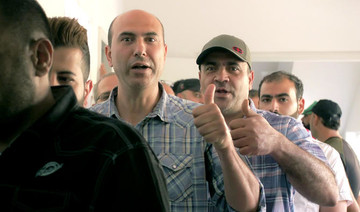BEIRUT: As Lebanese made their way to the voting stations in the country’s first parliamentary elections in nine years, the streets of Beirut came alive.
Roads filled with cars plastered with banners and posters representing the candidate or the lists people were supporting. Drivers relentlessly honked their horns to draw attention to their allegiance.
The capital is split into two voting districts, Beirut 1 and Beirut 2. Beirut 2 proved to be the most competitive in the country, having a total of nine candidate lists going head to head for 11 seats of the parliament — the most in all voting districts.
While voter apathy seemed as high this year, as it has been for past elections, some of those who had taken the trouble to reach the polling stations were frustrated by the long queues and disorganization.
“People are coming into the polling stations, cutting in line due to the typical ‘wasta’ while we are standing at the back of the line like proper citizens,” an angry voter in a polling station in Hamra told Arab News.
“We’ve been here for an hour waiting and we’re still at the back of the line … I’m here to practice my right for democracy, I’m not obliged to wait two to three hours. I’ll just leave.”
Blogger Nadia Mneimne told Arab News that owing to disorganization throughout the station, several people had to wait outside for hours as well.
Across the capital, stands plastered with political party colors and housing rival party supporters lined the sidewalks leading to the polling stations. Party members bluntly asked voters who they were voting for, and told them why they should vote for their candidates.
In Beirut, a cauldron of religions and powerful political dynasties, it was clear which particular sect dominated which area by the number of banners representing the political parties.
With voter turnout usually low, parties and coalitions have been resorting to old tricks deployed in previous elections to persuade people to vote for them, voters told Arab News.
Mona Fayed, who was voting in the gritty, working-class Zaqaq Al-Blat area, said she knew people in her area who had been paid by election campaigns to go and vote.
“There are a lot of people who are being paid to vote,” she told Arab News. “The political parties are taking advantage of the poor and their financial situations and giving them money just to go down to the voting stations and vote for their lists.”
Voters living abroad also told how some candidates paid for their flights so they could come and vote for them.
“I don’t have a passport but I’ve got the identity card so I can vote,” a British-Lebanese voter told Arab News. “I’m not going to tell you which political party paid our expenses, but I can tell you for certain that it isn’t the only party that has done such a thing.”
Paying for votes is strictly against election rules but common in Lebanese elections. And while paying to fly voters in for election day seems an expensive way to gain a vote, Lebanese expats said they had been offered similar deals as candidates and parties battle to gain small margins against their opponents for one of the parliament’s 128 seats.
While many polling stations faced similar issues of long queues, others appeared to be coping easily with the voters.
“These are the first elections that are exciting and comfortable,” Habib Hassan Syed Hussein, voting in Zuqaq Al-Blat, told Arab News. “Finally there is a sense of organization among the stations.”
Voter apathy and distrust of candidates have resulted in a poor turnout at the polls in past elections.
In the last parliamentary elections, held in 2009, just over half of the three million registered voters placed their ballots, according to the International Institute for Democracy and Electoral Assistance.
While the new electoral law has raised hopes that this time voters will be able to break the grip on seats held by the county’s traditional clans and parties, many were certain that it will all stay the same.
Lebanon’s new electoral system merges proportional representation with quotas for each religious group to maintain the country’s sectarian balance among the seats in parliament.
Under this arrangement, the majority system has been replaced and the threshold needed to win an election lowered — a plan that should benefit independents and reformers, easing the grip on the power of the country’s main clans.
Voters will cast ballots both for their favored list of candidates and a preferred candidate on that list.



















